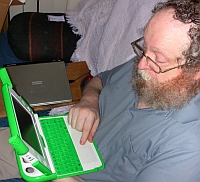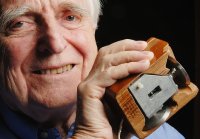We have just had the 40th anniversary of Doug Engelbart's Mother of All Demos, the day when Doug showed the mouse that everybody knows about in public for the first time as part of the oN-Line System (NLS).
It is not so widely known how much more Doug demonstrated that day. He started out with windows, graphics, structured text editing, hypertext, video chat, and much more that became the foundation of all Graphical User Interfaces by way of Alan Kay's Smalltalk at Xerox, and the Apple Lisa and Macintosh.
But there was far more even than that. Doug's group had invented astonishingly capable and productive software engineering techniques, an advanced version of bootstrapping. You start by building a simple software system on your hardware, with a simple command language, and then use that system to build an extension to create a more powerful language with more powerful commands, and so on and on.
This is the foundation for implementing systems as disparate as FORTH (frequently the first software bootstrapped on new computer architectures) and Smalltalk (meant to provide every facility a child needs for learning anything).
And yet even that was not all. The most astonishing feature of NLS was the rate of development, and the rate at which development accelerated during the project. Ever since then Doug has devoted himself to further developing his acceleration techniques, as he explains in what he calls the Beta edition of his book, Evolving Collective Intelligence.
This is in sharp contrast to the well-known saying that the IQ of a mob is the IQ of the dumbest person in the mob, divided by the number of people in the mob. Collective stupidity is in general much easier to observe than collective intelligence.

Ed Cherlin and his OLPC XO
What does this have to do with OLPC, then? In fact, I was explicitly invited to demonstrate the XO at the event, as one of the most important methods ever invented for augmenting global intelligence.
At the event itself, I spoke with Doug Engelbart about Earth Treasury's plans to start writing digital textbooks (of which more quite soon), and we agreed that incorporating Doug's techniques into our development process and teaching it to teachers and children would be an important addition to the project. Alan Kay, who was a featured speaker, also agreed with me during the event that it is time to create these next-generation textbooks.
What should a digital textbook look like? That's a tough one. Alan and Doug don't know. I don't know. It's kind of like asking Henry Ford to predict the Thunderbird or Lincoln product lines, and at the same time warn against the Edsel. All we know is bootstrapping. We can see far enough ahead to build the next system, and at the same time start designing the one after. That's all.
But the problem is not hopeless. We do have some idea of where we would like to get to. We can say what is desirable in digital textbooks, even if we are only building the first Model A this year. I mean, you probably want a car that is reliable, maybe inexpensive, goes fast enough, gets sufficient mileage to get from one gas station to another...You know the sort of thing. If it's a chick magnet (or guy magnet) in addition, well, so much the better.
So you want textbooks that help everybody understand the subject, not just ones that get most students past the next exam. You want to use the infinite patience of the computer to assist students. You probably don't want the inflexibility of conventional Computer-Aided Instruction, if you can avoid it. I know that many of you want textbooks that tell the truth, not the Official Version. If the better-educated students, with the better economic prospects, also have enhanced marriage prospects as a result, well, would you complain? We know that all of that is possible, because it has been done at one time or another, usually at great expense. Now we can make it affordable.
Henry Ford's driving vision was a car that his own factory workers could afford. We are closing in on an education that even the poorest people in the world can afford, but better still, once they get it, they won't be that poor any more, and at some point they won't be poor at all. Now that's what I call getting collectively smarter.



Isaac Asimov has written an essay about the ultimate device to 'replace' books, "The Ancient and the Ultimate".
Another go at it in this review:
http://homepage.mac.com/jhjenkins/Asimov/Books/Book144.html
The answer is obvious ;-) if you know the SF of Asimov?
Winter
Only if the texts will be free - as in beer? - like wikipedia. Only then will it be helpful and useful.
>>> Only if the texts will be free - as in beer? - like wikipedia. Only then will it be helpful and useful.
Free as in Freedom is more important than free as in beer. Wikipedia is Free as in Freedom.
One of the Four Freedoms is the Freedom to redistribute it, so Free as in Freedom stuff always includes free as in beer as a side effect, but not the other way around.